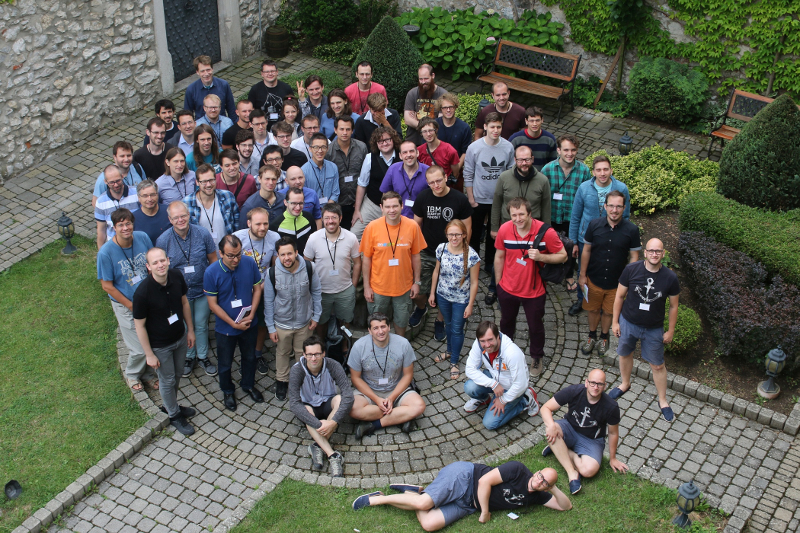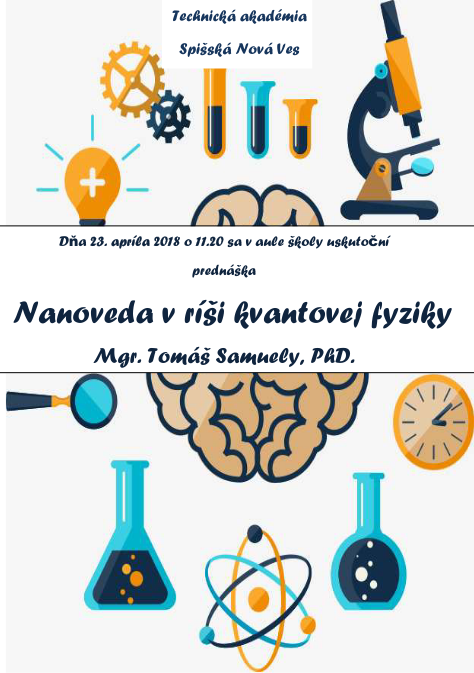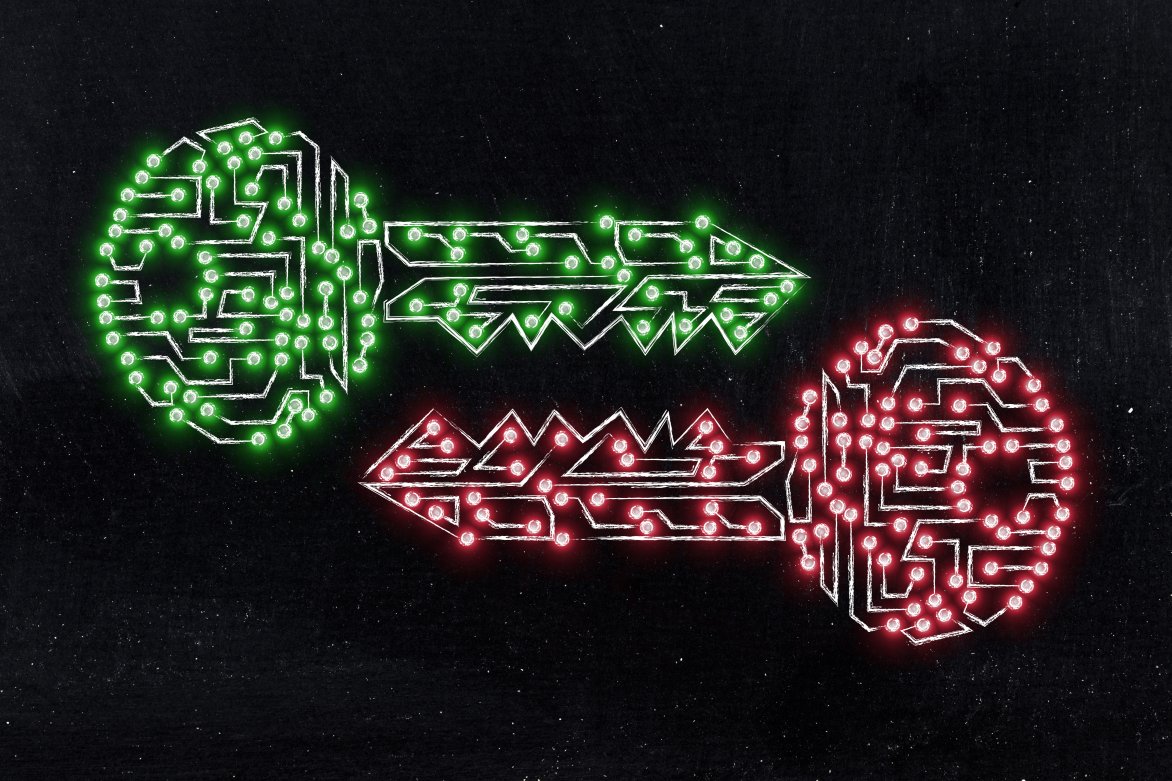27 November 2018 - Popularisation

Focused on atom
Popular science talk [in Slovak] of Martin Gmitra (University P.J.Šafárika, Košice) for high school students at Gymnázium P. J. Šafárika in Rožňava.
Place: Gymnázium P. J. Šafárika, Rožňava, Slovakia
Time: 27/11/2018, 8:30
22 November 2018 - Workshop
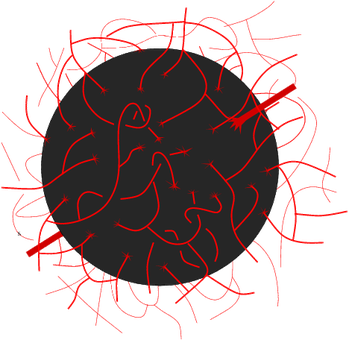
Gravity in Qubits
Participants of QSS consortium will meet in November, 21-24 in Slovakia (Bratislava and Smolenice) for an exceptional colloquium, to discuss opportunities for the cross fertilization of Quantum Computing and Quantum Gravity. Particular emphasis will be given to opportunities for near future experiments to probe quantum gravitational effects and theoretical implications.
http://www.qsimspacetime.com/gravity-in-qubits.html
07 November 2018 - Popularisation
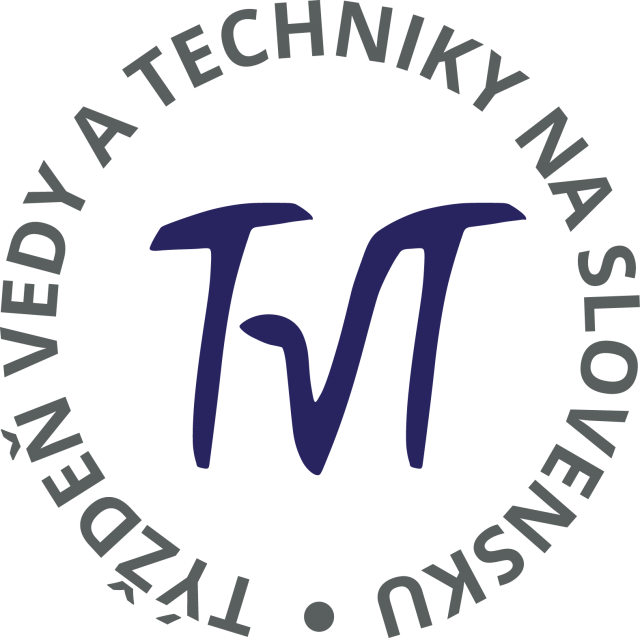
Slovakia Science and Technology Week
During the week (5-9/11/2018), the research institutions are organizing various public events and popularisation-oriented activities. Here are our activities:
- Institute of Physics of Slovak Academy of Sciences (Dúbravská cesta 9, Bratislava)
07/11 Open Doors Day http://fu.sav.sk/index.php?id=dod
- 11:00 Daniel Reitzner - On quantum technologies [popular science talk in Slovak]
- 9:00-16:00 Laboratory of quantum measurements (refrigerator, superconducting magnets and qubits)
- 9:00-16:00 Meet and ask researchers (seminar room, Research Center for Quantum Information) - Mathematical Institute of Slovak Academy of Sciences (Štefánikova 49, Bratislava)
07/11 Open Doors Day http://www.mat.savba.sk/index.html
- 9:00 Martin Plávala - On impossibility of doing two things jointly and how this is interesting for physicists and computer scientists [popular science talk in Slovak]
20 October 2018 - Popularisation
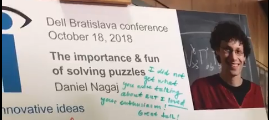
The importance of (quantum) puzzles
A popular-science talk at Dell 3i conference in Bratislava given by Daniel Nagaj from Research Center for Quantum Information of Institute of Physics of Slovak Academy of Sciences.
Place: Bratislava, Slovakia Time: 20/10/201
16 October 2018 - Meeting
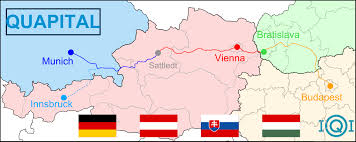
QUAPITAL Meeting in Bratislava
Program:
10:00 Welcome
10:15 Introduction of each partner
10:30 Technical introduction, Visions, Goals (Rupert)
11:15 Discussion Fiber-connections: Status in each country
12:00 Lunch
13:00 Quapital webpage and feedback from partners (currently under development)
13:30 MoU for the consortium
14:00 Funding opportunities
17:00 Closing remarks
Time: 16/10/2018, 10:00-19:30 (Tuesday)
Place: QUTE building, Dúbravská cesta 9, Bratislava - Patrónka [map]
05 October 2018 - Popularisation
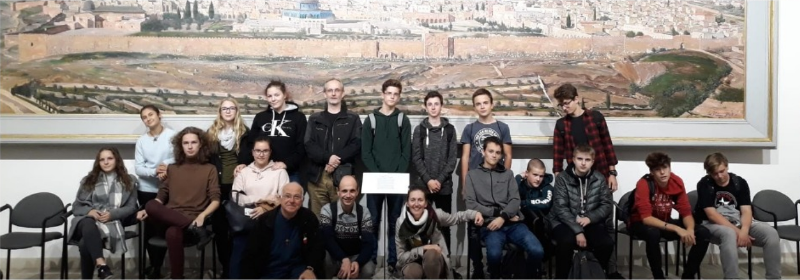
Statistics in biology
Popular-science lecture (in Slovak) of Andrej Gendiar on the necessity of scientific method and statistical analysis in the work of Gregor Mendel - “father” of modern genetics.
Place: Mendel Museum, Brno, Czech Republic Time: 05/10/2018
28 September 2018 - Popularisation
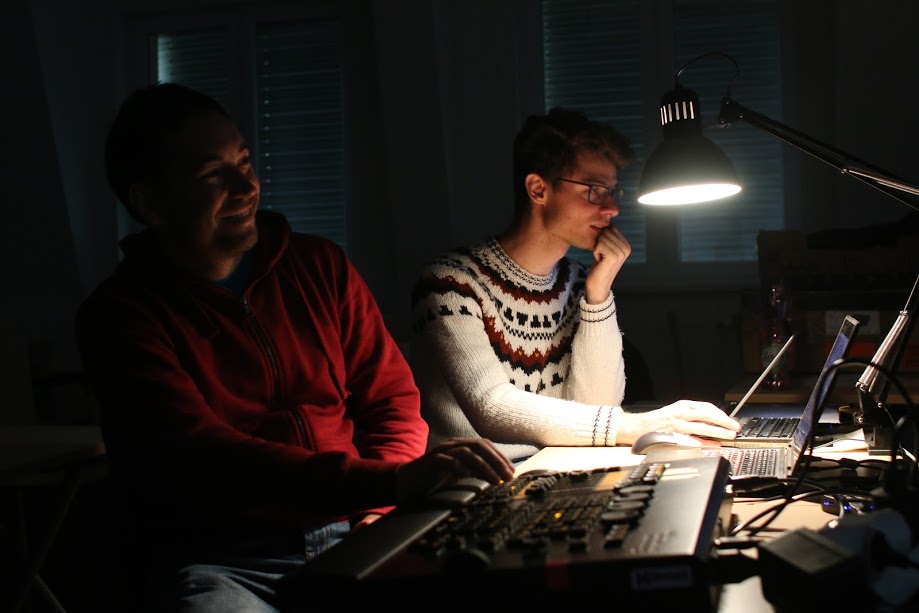
European Researcher’s Night 2018
Our activities under the umbrella of this action:
Čo dokážu kvantové počítače? / What can the quantum computers do? [in Slovak]
- popular talk by Gabriel Semanišin (UPJŠ, Košice)
- Place: Atrium Optima, Košice
Kvantová informácia a jej možnosti využitia v praxi / Quantum information for practical applications [in Slovak]
- popular talk by Daniel Reitzner (FÚ SAV, Bratislava)
- Place: 20:00, Lab.cafe, Námestie SNP 25, Bratislava
Quantum technologies for everyone
- exhibition by RCQI, FU SAV
- Place: 9:00-22:00, Stará tržnica, Bratislava
D€$ifRu7 [in Slovak, started in July]
- puzzle game created by Daniel Reitzner, Libor Caha and Mario Ziman
- http://sifrovacka.nocvyskumnikov.sk/
11 July 2018 - Popularisation
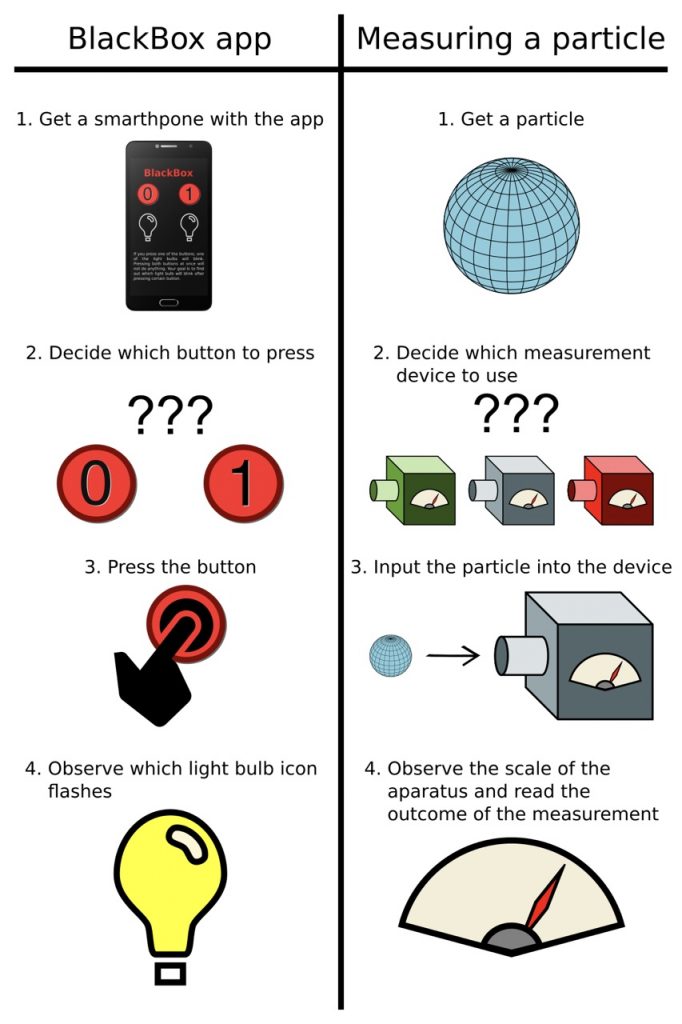
A simple demonstration of incompatibility of measurements
This is a Leap — a popular science article on quantum research written by scientists and reviewed by teenagers — published in Quantum Views. Our colleague Martin Plávala, PhD student of Mathematical Institute of Slovak Academy of Sciences, has won in this international competition.
Abstract: The incompatibility of measurements is a strange feature of Quantum theory that forbids us from performing two measurements at the same time. Usually presented in the form of Heisenberg’s uncertainty principle, it is one of the more inexplicable and counterintuitive features of quantum theory. In this following article I will show you a simple model that demonstrates the incompatibility of measurements. The model that will be presented in this paper will be as simple as possible. Although it is as realistic as I was able to make it, it is still just a model and we will have to take its rules as strictly given.
Author: Martin Plávala
Ref: Quantum Views 2, 8 (2018)
https://doi.org/10.22331/qv-2018-07-11-8
A version of the paper in Slovak is available as blog Dennik N: Demonštrácia nekompatibility meraní v kvantovej mechanike and a related short interview (in Slovak) with the author is available on the website of Slovak Academy of Sciences:
Viete vysvetliť kvantový výskum teenagerovi? Takto sa začína výzva vedeckého časopisu Quantum. Zaujala aj mladého slovenského doktoranda z Matematického ústavu SAV Martina Plávalu. Počas svojho výskumného pobytu vo Fínsku sa zapojil do projektu, ktorý urobil z austrálskych stredoškolákov odborných hodnotiteľov vedeckých článkov. Pri posudzovaní článkov žiaci simulovali tzv. peer-review, čo je štandardná forma hodnotenia článkov vo vedeckých časopisoch. Podmienkou však bolo, aby bol článok napísaný zrozumiteľne. Vo veľkej konkurencií vybrali školáci aj Martinov text.
13 June 2018 - Workshop
CEQIP 2018
15th edition of the traditional workshop focused on current trends in theoretical quantum information sciences. Deadline for paper submission is April 3rd. The meeting will take place in the charming Smolenice castle, 13-16 June. More information is available at CEQIP website.
13 June 2018 - QUAPITAL Seminar
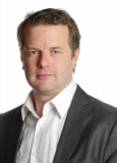
A network for quantum communication in midle-eastern European countries
In my presentation I will present our work we achieved so far with regards to quantum sources and new detection schemes. Then some of our free-space and fiber based communication experiments will be presented. Lastly I will sketch a new effort for bridging the borders to expand this networks across Europe and the first steps we will do between Vienna, Bratislava and Budapest on one side and Munich on the other.
Speaker: Prof. Rupert Ursin is a group leader and senior scientist at the IQOQI (Vienna). His main field of research is to develop quantum communication and quantum information processing technologies, mainly for free-space, but also for fibre-based systems. The scope of his work ranges from near term engineering solutions for secure key sharing (quantum cryptography) to more speculative research (de-coherence of entangled states in gravitational fields). Experiments on quantum communication and teleportation using entangled photon pairs is also among his interests, with the long- term goal of a future global quantum network based on quantum repeaters. He has been experimentally active in numerous international collaborations in Germany, Italy, Spain, USA as well as in China and Japan. Lead several ESA funded projects as well as on the national and EU level. These allowed him to perform highly recognized experimental studies e.g. on a 144 km free-space link between La Palma and Tenerife. His group is performing time-energy entanglement distribution over a turbulent atmosphere just recently. To date he and his publication recived several international awards and prizes. He was invited to several prestigious conferences to deliver talks (e.g. IEEE, SPIE, QCMC and others) and serves to important conferences as a program committee member e.g. ICSOS, SPIE, QCrypt and others. He currently holds a guest professorship at the University of Science and Technology (USTC) in Shanghai, China.
Time: 27/04/2018, 11:15 (Friday)
Place: QUTE building, Dúbravská cesta 9, Bratislava - Patrónka [map]
This informal research seminar is open for everyone - non-specialists, science fans and students are kindly welcome.
23 April 2018 - Popular [in Slovak]
Nanoscience in quantum physics land / Nanoveda v ríši kvantovej fyziky
A popular-science talk given by Tomáš Samuely from Center of low temeprature physics (Košice) for high school students of Technical Academy in Spišská Nová Ves. In this talk he explains the story of atoms and particles, development of quantum physics, and also current research questions and challenges in manipulation with individual quantum systems.
Place: Technical academy, Hviezdoslavova 6, Spišská Nová Ves, Slovakia
Time: 23/04/2018, 11.20
15 April 2018 - Inmedia - Otokar Horák (Dennik N)
Slovenskí vedci sa budú v projekte NATO zaoberať šifrovaním v ére kvantových počítačov
Hoci kvantové počítače zatiaľ neexistujú, vedci dokážu odhadnúť ich parametre a silu. Preto navrhnú bezpečnostné šifry tak, aby odolali ich predpokladanej výpočtovej sile.
…. Prečítajte si viac v Denniku N ….
15 April 2018 - Project
NATO Science for Peace and Security Programme Secure Communication in the Quantum Era
Acronym: SPS Project Number: G5448
Duration: 2018-2021
This proposal will design, analyze, and implement solutions to securely establish cryptographic keys among a group of participants. We use cryptographic theory to establish structural guarantees at the protocol level and explore performance through implementation on different platforms. Hardness assumptions are chosen to be quantum-safe (based on coding theory or/and lattices). To protect the implementation against manipulation at runtime (e.g., through fault induction), we apply runtime verification. To ensure the necessary capabilities are available, ranging from cryptographic theory to advanced software engineering and signal-level analysis (for hardware implementations), a team of four universities has been formed.
Project coordinator: Prof. Otokar Grošek (FEI STU, Bratislava)
05 April 2018 - Project
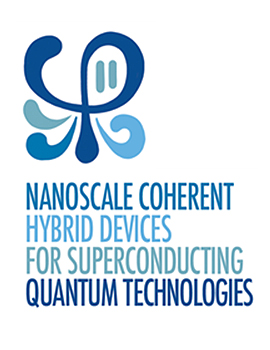
COST Action CA16218
Nanoscale coherent hybrid devices for superconducting quantum technologies
Acronym: NANOCOHYBRI
Duration: 01/11/2017-31/10/2021
Superconducting technologies are prime candidates to ripen quantum effects into devices and applications. The accumulated knowledge in decades of work in understanding superconductivity allows scientists now to make experiments by design, controlling relevant parameters in devices. A new field is emerging whose final objective is to improve appliances taking advantage of quantum effects, be it for dissipationless transport of current, generation of high magnetic fields, sensors or quantum information. The field will impact crucial areas for societal development, including energy, transport, medicine or computation. Quantum behavior is controlled by using hybrids of superconductors with magnets, insulators, semiconductors or normal metals. Traditionally, the scientific and technical communities working in superconductivity are spread across projects from different calls, whose activities put Europe at the frontier of research. The present Action aims to address the pressing need for a common place to share knowledge and infrastructure and develop new cooperative projects.
Slovakia MC member: Prof. Peter Samuely (Košice)
01 April 2018 - Project
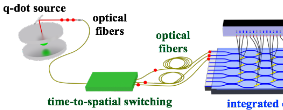
High dimensional quantum photonic platform
The only successful QuantERA project with Slovak partner HiPhoP has been aproved for financing by the Slovak Academy of Sciences. QuantERA call is understood as the pre-phase of European Quantum Technology Flagship. The project will start on April 1st.
22 March 2018 - Workshop
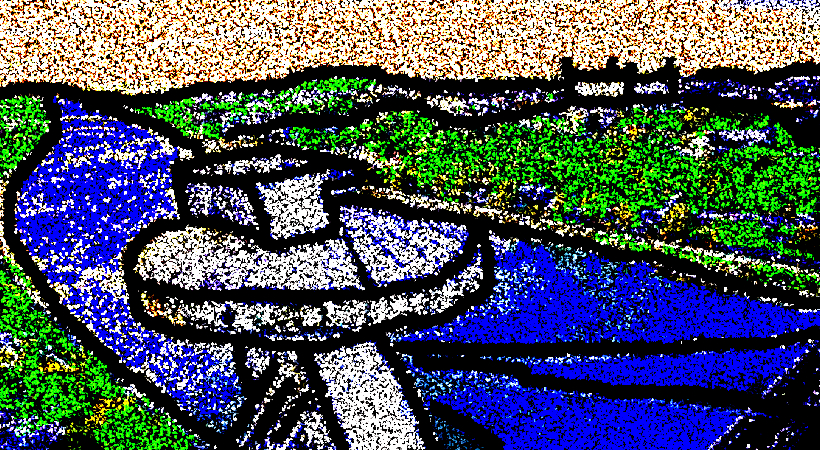
MACROQUAS 2018 - Optomechanical route to macroscopic superpositions
The aim of this workshop is to pin-point the suitability of levitated optomechanics as a test-bed for the investigation of the validity of quantum theory at the mesoscopic and macroscopic scale; identify the fundamental challenges of such tests and the it will address opportunities offered by a space-based configuration; compare the capabilities of levitated optomechanics to those of other platforms such as magneto-levitated one for the identification of the best-suited experimental platform. Continue on MACROQUAS 2018 webpage.
When: 22-23/03/2018
Place: Pavilón kvantových technológií, Dúbravská cesta 9, Bratislava - Patrónka [map]
15 March 2018 - News

Kvantové technológie na Slovensku
Kvantový flagship je dnes jednou z hlavných výskumných priorít Európskej komisie, ktorého cieľom je podpora európskeho výskumu v oblasti tzv. kvantových technológií. Vedná oblasť kvantovej teórie informácie, z ktorej výsledkov vznikajúce kvantové technológie čerpajú, vznikla ešte v devädesiatych rokoch minulého storočia. V roku 2000 prof. Vladimír Bužek založil na Fyzikálnom ústave SAV oddelenie Centrum pre výskum kvantovej informácie, ktoré sa venuje teoretickému vývoju kvantových technológií. Medzi desať najcitovanejších vedeckých prác z fyziky (vrátane publikácií z CERNu) na Slovensku patria práce prof. Bužeka o kvantovom klonovaní a kvantovom komunikačnom protokole “quantum secret sharing”. Dnes sa výskumníci centra sústreďujú na oblasť kvantových sietí, kvantovej výpočtovej zložitosti, kvantovej metrológie a vývoju efektívnych výpočtových nástrojov na simulovanie kvantových systémov. Matematický výskum v oblasti kvantových štruktúr a logík na Matematickom ústave SAV rozvíjal prof. Anatolij Dvurečenskij a jeho kolegovia ešte pred objavom ich potenciálu v informačných technológiách. Ich práce patria na Slovensku medzi tie najcitovanejšie v matematike. Experimentom v oblasti kvantového počítania sa venuje výskumný tím pod vedením prof. Miroslava Grajcara, ktorý, v spoločnom laboratóriu Fakulty Matematiky, Fyziky a Informatiky UK a Fyzikálneho ústavu SAV, pracuje na supravodivej implementácii kvantových bitov, s aplikáciami najmä v oblasti kvantových meraní a kvantovej optiky v mikrovlnom režime. Vývoj kvantových technológií priamo súvisí aj s materiálovým výskumom (realizáciou exotických systémov ako napr. Majoranovské fermióny), ktorý zastrešujú (celosvetovo) unikátne nízkoteplotné laboratóriá Ústavu experimentálnej fyziky SAV (prof. Peter Samuely) a Prírodovedeckej fakulty UPJŠ (prof. Alexander Feher) v Košiciach.
13 March 2018 - Project

COST Action CA15220
Quantum Technologies in Space
Acronym: QTSPACE
Duration: 20/10/2016-19/10/2020
Quantum theory and space science form building blocks of a powerful research framework for exploring the boundaries of modern physics through the unique working conditions offered by experimental tests performed in space. Space-based sources of entangled photons promise the formation of global quantum communicationetworks, long-distance tests of quantum theory and the interplay between relativity and quantum entanglement. Long free-fall times enable high- precision tests of general relativity and tests of the equivalence principle for quantum systems. Harnessing microgravity, high vacuum and low temperature of deep space promises allowing the study of deviations from standard quantum theory for high-mass test particles. Space-based experiments of metrology and sensing will push the precision of clocks, mass detectors and transducers towards the engineering of novel quantum technologies. Our particular contribution is theoretical and covers the following research goals:
- Development of communication protocols over quantum networks,
- Optimization of quantum networks,
- Development of verification and testing algorithms.
Slovakia MC member: Mário Ziman (Bratislava)
27 February 2018 - Seminar
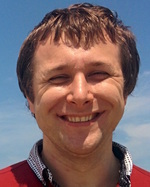
Optimal Port-based Teleportation in Arbitrary Dimension
Quantum teleportation is one of the earliest and most widely used primitives in Quantum Information Science which performs an arbitrary quantum state transfer between two spatially separated systems. It involves pre-sharing an entangled resource state and consists of three simple stages. The first stage involves a joint measurement of the teleported subsystem together with the share of the resource state on the sender’s side. In the second step, a classical measurement outcome is communicated to the receiver. The last step consists of applying a requisite correction operation which recovers the transmitted quantum state. Port-based teleportation (PBT) is a unique set of teleportation protocols in that they do not require unitary correction. We study PBT protocols and fully characterize their performance for arbitrary dimensions and number of ports. We find the optimal probability of success and the fidelity of teleportation for all probabilistic and deterministic PBT schemes. In the latter case, surprisingly, the answer depends only on the largest eigenvalue of a certain easy to construct a matrix which encodes the relationship between a set of Young diagrams and emerges as the optimal solution to the relevant semidefinite program. To derive our results, we develop new mathematical tools to study the symmetries of the operators that arise in PBT protocols and belong to the algebra of partially transposed permutation operators. These tools can be used to characterize quantum systems with partial symmetries. Quantum states occurring in the PBT protocol are one such example. Systems with partial symmetries are widespread but in contrast to their permutational-invariant counterparts very little is known about how to efficiently estimate their properties.
Speaker: Sergii Strelchuk (Cambridge)
Time: 27/02/2018, 11:00
Place: QUTE building, Dúbravská cesta 9, Bratislava - Patrónka
19 February 2018 - School
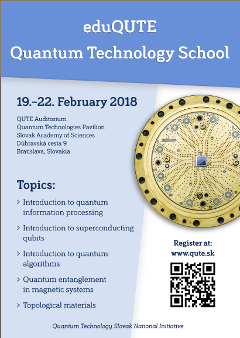
1st eduQUTE school on quantum technologies
This pilot school is organized as part of the preparation of a Slovak research initiative in quantum technologies. Its main goal is to introduce the elementary physical principles of quantum technologies developing by researchers in Slovakia. It is open for any student or researcher. The subjects will be presented at master level. [ download leaflet ]
Date: 19-22/02/2018
Place: Pavilón kvantových technológií, Dúbravská cesta 9, Bratislava - Patrónka [map]
Program: ./1st_eduqute_school.html
18 January 2018 - Seminar
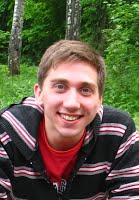
Time deformations of quantum master equations
Speaker: Sergey N. Filippov (Moscow)
Abstract: We subject convolutionless and convolution master equations to time deformations and explore properties of the modied maps. Positive and completely positive divisibility of the original dynamical map is related with positivity and complete positivity of the deformed map. We provide examples of time-local and convolution master equations for qubits to illustrate the results.
Time: 18/01/2018, 11:00
Place: QUTE building, Dúbravská cesta 9, Bratislava - Patrónka
